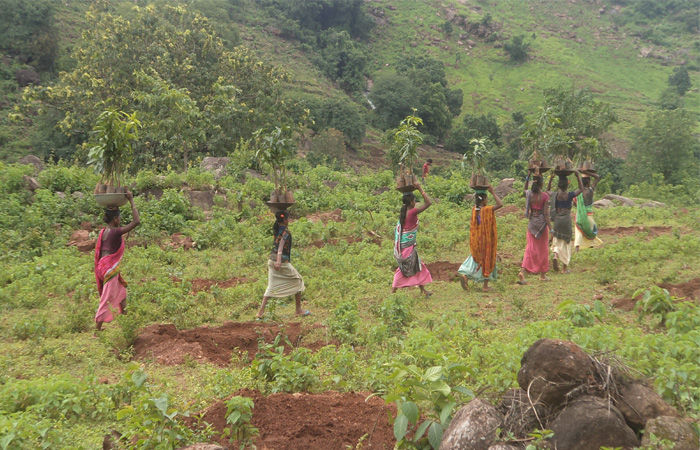
Gujarbadi is a small tribal village of Kutuli Gram Panchayat of Rayagada district in Odisha State. 50 Tribal Kandha families are living at that village. This village has included in the project during SOUL II. This village peoples have more natural resources as compare to the village population. Village Action Team has been formed in this village by the project staff and the VAT members are setting once in a month and discussed about their village problems. One of the major problems of the village was its degraded forest. So the VAT members bother about its conservation and protection. Agriculture is the prime source of the livelihood in the village.
The project staff suggested to the VAT members to convert their degraded forest into food forest by planting fruits bearing trees, medical plants and forest species in their village forest. If it will protect in proper manner in the future it will provide livelihood to the village. The village people can collect fruits, medicinal plants and fodder for animals. The VAT members agreed to do food forest model in their village. The villager selected land and contributed labour to clean that area for plantation purposes. Initially stage Ekta provided some fruits bearing trees by convergence with Horticulture department. Some plants had purposed from local nursery. Around 75 plants have planted by the villager. The villagers were contributed labour for planting the tress and prepared boundary fencing around the plants in the month of July, 2016.
During the field visit of Mr. Basanta Panigrahi, Officer Program, IGSSS suggested to include some local varieties of fruits bearing tree, medicinal plants, forest species in the food forest so that the concept of the forest will be fulfilled. He also suggested for watering during the summer.
Due to proper care and protection by the VAT members now nearly 60 plants have survived. The village people are very happy to see the survival of the plants. Now the villagers are planning to collect plants local varieties of fruits bearing trees i.e. jackfruit, mango, tamarind, banana etc. in the monsoon. The VAT members and villagers are very happy to see the survival of the trees. The VAT will do land development activity i.e. 5% model by digging pit in the size of 10 x 3 x 2 for water and soil conservation during rain. In the summer these pits could be used as a compost pit for the food forest. This model will be replicated in more villages in project areas in the coming days.
